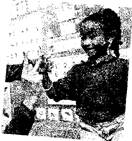
题目列表(包括答案和解析)

Jessie felt her life so boring one summer day. She was tired of watching TV, she read all her books, and her friends were on vacation. She wanted something different to do. Suddenly, she saw the lawn mower(割草机) sitting in the yard.
“Mom,” she shouted, “I think I will mow the lawn.” Her mom ran into the yard and said, “Oh no, you don’t. You’re too young to mow the law.”
“I’m fourteen years old and know how to do it,” Jessie said. “Besides, it would help Dad out, and he won’t have to worry about it over the weekend.”
Mom thought for a while and then decided to let Jessie give it a try. After all, she was home and would keep an eye on her. Jessie already knew how to start the lawn mower from watching her dad. Jessie checked the gas(汽油) to make sure it was full, and put on her gardening gloves to protect her hands. Mom watched from the kitchen window. Jessie really does know how to mow the lawn. She was very careful around the flowers and trees. When she finished, she felt so good, but she was so hot. Mom brought her some ice tea and said, “You sure did a great job. Dad will be very surprised.”
Later that day, Dad came home and said to Jessie’s mom, “You didn’t have to mow the lawn. I was going to do it on Saturday. It looks great. Thanks.”
“I didn’t mow it. Jessie did.”
“Wow, our little girl is growing up!” Dad told Jessie what a great job she had done.
“It was fun, and I will do it again next week,” said Jessie.
The neighbor next door came by and asked Jessie if she wanted to mow his lawn and make some money. “Sure!” said Jessie. Jessie began mowing his lawn. Two other neighbors asked so, then another three. Jessie was now mowing lawns for them all and making some money. She was no longer bored! “I won’t have time to spend my money,” she laughed to herself.
根据材料内容选择最佳答案,并将其标号填入题前括号内。
【小题1】In order to do something different, Jessie decide to _______.
| A.read books | B.travel | C.mow the lawn | D.watch TV |
| A.保护 | B.注视 | C.培养 | D.瞄准 |
| A.washed her hands | B.bought some gas |
| C.read some instructions | D.put on her gloves |
| A.Proud. | B.Angry. | C.Relaxed. | D.Worried. |
| A.Neighbors should learn to help each other. |
| B.Mowing the lawn is a good way to make money. |
| C.Doing something helpful can make people happy. |
| D.Children should help their parents at an early age. |
| 表二 | ||
| 速度 | 质量 | 滑行距离 |
| 相同 | 大 | 相同 |
| 较大 | ||
| 小 | ||
| 表一 | ||
| 速度 | 质量 | 滑行距离 |
| 快 | 相同 | 远 |
| 较快 | 较远 | |
| 较慢 | 近 | |
Living in a foreign culture can be exciting, but it can also be confusing(令人迷惑的). A group of Americans who taught English in other countries recently discussed their experiences. They decided that miscommunications(沟通误解)were always possible, even over something as simple as “yes” and “no”.
On her first day in Micronesia, an island in the Pacific(太平洋), Lisa thought people weren’t paying any attention to her. The day was hot. She went into a store and asked, “Do you have cold drinks?” The woman there didn’t say anything. Lisa repeated the question. Still the woman said nothing. She later learned that the woman had answered her: She had raised her eyebrows(眉毛),which in Micronesia means “yes”.
Jan remembered an experience she had in Bulgaria, a country in Europe. She went to a restaurant that was famous for its cabbage. She asked the waiter, “Do you have cabbage today?” He nodded his head. Jan waited, but the cabbage never came. In that country, a nod means “no”.
Tom had a similar problem when arrived in India. After explaining something in class, he asked his students if they understood. They answered with many different nods and shakes of the head. He thought some people had not understood, so he explained again. When he asked again, they did the same thing. He soon found out that his students did understand. In India, people nod and shake their heads in different ways depending on(依据)where they come from. You have to know where a person is from to understand whether they mean “yes” or “no”.
【小题1】The Americans teaching English in other countries found that they .
| A.should go abroad for vacations |
| B.needed to learn foreign languages |
| C.should often discuss their experiences |
| D.had problems with communications |
| A.nodding heads | B.raising eyebrows | C.shaking heads | D.saying “no” |
| A.he did not know much about Indian culture |
| B.he didn’t explain everything clearly enough |
| C.some students didn’t understand his questions |
| D.he didn’t know where the students came from |
| A.In Bulgaria, nodding heads means “no”. |
| B.Jan taught English on a Pacific island. |
| C.Lisa was trying to buy some cabbage. |
| D.In India, only shaking heads means “yes”. |
| A.body language in foreign restaurants |
| B.class discussion in India schools |
| C.miscommunication in different cultures |
| D.English teaching in other countries |

Mr. Klein told the class that a new student, Inez, would join them soon. He 1 that Inez was deaf. She “talked” with others by using sign language. Mr. Klein knew sign language, and he decided to teach 2 students so that they could also “talk” with Inez.
First, they learned to sign the letters. Some letters were hard to 3 . Other letters, such as C ,were easier because the shape of the hand was the same as the shape of the letter.
The 4 thing they learned was finer spelling. They signed one letter after another to spell a word. They 5 with two-letter words such as at and on . Then they spelled 6 words.
Finally, Mr. Klein showed that 7 one sign could be used for a whole word. To make the sign for the word fine, a person spreads out the fingers on one hand, 8 the thumb(拇指) to the chest(前胸) , and moves the hand away from the chest. Signing is not just done with the hands. Expressions on the face are also 9 . The students learned to sign a question mark by using expressions on the face.
When Inez first entered the classroom. She looked 10 . But the students signed, “Good morning, Inez. ” She gave the class a big smile and signed back, “What a wonderful welcome !”
| 【小题1】 |
|
| 【小题2】 |
|
| 【小题3】 |
|
| 【小题4】 |
|
| 【小题5】 |
|
| 【小题6】 |
|
| 【小题7】 |
|
| 【小题8】 |
|
| 【小题9】 |
|
| 【小题10】 |
|

Jessie felt her life so boring one summer day. She was tired of watching TV, she read all her books, and her friends were on vacation. She wanted something different to do. Suddenly, she saw the lawn mower(割草机) sitting in the yard.
“Mom,” she shouted, “I think I will mow the lawn.” Her mom ran into the yard and said, “Oh no, you don’t. You’re too young to mow the law.”
“I’m fourteen years old and know how to do it,” Jessie said. “Besides, it would help Dad out, and he won’t have to worry about it over the weekend.”
Mom thought for a while and then decided to let Jessie give it a try. After all, she was home and would keep an eye on her. Jessie already knew how to start the lawn mower from watching her dad. Jessie checked the gas(汽油) to make sure it was full, and put on her gardening gloves to protect her hands. Mom watched from the kitchen window. Jessie really does know how to mow the lawn. She was very careful around the flowers and trees. When she finished, she felt so good, but she was so hot. Mom brought her some ice tea and said, “You sure did a great job. Dad will be very surprised.”
Later that day, Dad came home and said to Jessie’s mom, “You didn’t have to mow the lawn. I was going to do it on Saturday. It looks great. Thanks.”
“I didn’t mow it. Jessie did.”
“Wow, our little girl is growing up!” Dad told Jessie what a great job she had done.
“It was fun, and I will do it again next week,” said Jessie.
The neighbor next door came by and asked Jessie if she wanted to mow his lawn and make some money. “Sure!” said Jessie. Jessie began mowing his lawn. Two other neighbors asked so, then another three. Jessie was now mowing lawns for them all and making some money. She was no longer bored! “I won’t have time to spend my money,” she laughed to herself.
根据材料内容选择最佳答案,并将其标号填入题前括号内。
1.In order to do something different, Jessie decide to _______.
A.read books B.travel C.mow the lawn D.watch TV
2.What does “keep an eye on” mean?
A.保护 B.注视 C.培养 D.瞄准
3.Before Jessie mowed the lawn, she ______.
A.washed her hands B.bought some gas
C.read some instructions D.put on her gloves
4.How did Jessie’s father feel when he knew Jessie had mowed the lawn?
A.Proud. B.Angry. C.Relaxed. D.Worried.
5.What does the text mainly tell us?
A.Neighbors should learn to help each other.
B.Mowing the lawn is a good way to make money.
C.Doing something helpful can make people happy.
D.Children should help their parents at an early age.
湖北省互联网违法和不良信息举报平台 | 网上有害信息举报专区 | 电信诈骗举报专区 | 涉历史虚无主义有害信息举报专区 | 涉企侵权举报专区
违法和不良信息举报电话:027-86699610 举报邮箱:58377363@163.com